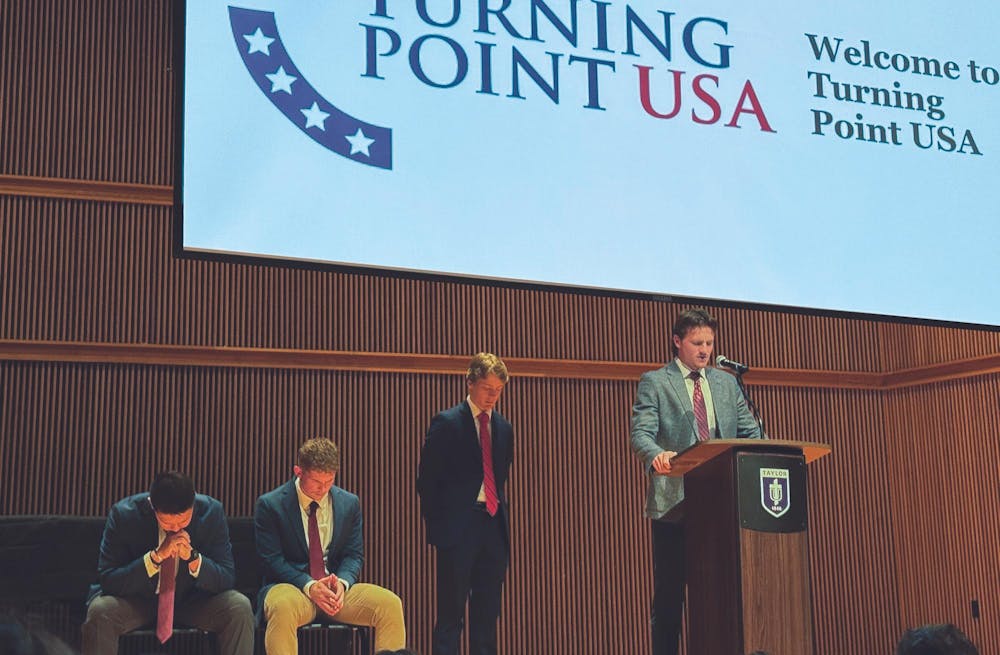Approximately 100 students and faculty members gathered for the Turning Point USA (TPUSA) callout meeting in the Butz-Carruth Recital Hall, Monday Sept. 29 at 7 p.m. The meeting served to inform the campus about TPUSA’s mission and gauge student interest in the club as it moves through the approval process.
TPUSA is a conservative, non-profit organization founded by Charlie Kirk in 2012. Its chapters operate on over 900 college campuses nationwide, promoting values such as freedom of speech, free markets and limited government among American students, their website stated.
After opening the Taylor TPUSA callout meeting in prayer, the four club officers, Andrew Roth, John Crouch, Lucas Moseley and Collin Hunt, all sporting suits with red ties, took turns explaining the club’s history, mission and structure.
Roth, a sophomore accounting and finance double-major and the club’s president, shared the club’s background and mission statement with the audience.
“Our chapter mission statement is to equip students to engage culture and politics through biblical truth, promoting fiscal responsibility, free markets, limited government and constitutional rights as God-given blessings,” Roth said. “We aim to help students think critically, live faithfully and speak courageously, grounding our work in Scripture, prayer and the pursuit of truth.”
The cabinet members’ presentation lasted around ten minutes, followed by twenty minutes of questions from attendees. Many individuals, including some faculty members, expressed interest in the club.
“I’m excited for the possibility of a TPUSA organization on campus, and I’m excited the heart behind this one seems focused on Christ,” Kenna Hartian, a junior multimedia journalism major, said. “Honest, intellectual debate is important, especially as Christians. We need to be able to articulate why we believe what we believe and I think TPUSA gives us the opportunity to do that.”
However, a few students voiced hesitancy.
Ava Smith, a junior politics & law and OVC double-major, resonated with the club leaders’ concerns about political apathy on campus. However, she worries that a TPUSA chapter on Taylor’s campus could promote the false idea that all students hold the same political views.
Smith also shared her concerns about Taylor students’ media literacy, fearing that a TPUSA chapter would present students with a one-sided view of the news, arming them with talking points without encouraging them to think for themselves.
“I just think that makes our students susceptible to, in the future, needing to latch onto another organization to tell them what to think and how to say it,” Smith said. “I want individual students to know how to read the news and know how to critically think about issues and then form an opinion that is in line with their Christian worldview on the matter.”
In 2021, the Taylor University Student Senate shot down an attempted Taylor TPUSA chapter with a 13-4 vote, former Echo articles reported. The Senate mainly opposed the club’s affiliation with TPUSA. They felt that the organization stirred up conflict and controversy, deviating from Taylor University Clubs’ values and mission.
The Senate also expressed “concerns that the mission and actions of TPUSA as a national organization do not accomplish unique goals that political clubs, like AEI (American Enterprise Institute), already provide,” a Turning Point blog post stated.
However, by showcasing the club’s student support and emphasizing Taylor and TPUSA’s shared biblical values, club officers hope to receive a different answer in 2025, Lucas Moseley, a senior finance major and the chapter’s treasurer, said.
The officers added that TPUSA’s national branding, resources and networking opportunities create more value for the university than a non-affiliated conservative club could.
Taylor’s TPUSA club leaders will appear before the Student Senate Oct. 14, Moseley said. The chapter has already submitted its foundational documents, such as its chapter constitution, for review by the Senate. During the meeting, the TPUSA club’s cabinet will present their case and answer Senate members’ questions.
If the Senate votes for its approval, the club moves on to consideration by the Community Life Committee (CLC), formed of a mixture of faculty and students. If passed through the CLC, the TPUSA chapter will then be presented before the Senior Leadership Committee for a final stamp of approval.
The TPUSA chapter plans to hold bi-weekly meetings, John Crouch, a sophomore politics, philosophy & economics major and the club’s vice president, said. Within each meeting, the leaders will spend 15-20 minutes sharing the latest global and national news and then move into a time of education and activities.
Education is the main focus of chapter gatherings, Crouch said. Each meeting will focus on one specific topic, like why Christians should engage in politics. This section is also when club leaders plan to bring in guest speakers, such as local government officials and professors.
Crouch added that the cabinet also plans to make open forums, a time of student discussion and civil debate, a regular part of meetings.
“We believe that everyone, no matter what their political beliefs are, should have the opportunity to express what they believe in,” Crouch said.
Crouch emphasized the chapter’s faith focus. Each meeting will start and end with prayer, he said.
Club leaders hope prayer will set the tone for conversations and discussions within meetings.
“We believe as Christians that everything that we do should be grounded in faith and anchored in the word,” Crouch said.
Moseley shared that the chapter was formed to combat apathy toward civic and cultural engagement at Taylor and within the Church.
As Christians and as Taylor students being trained to embody servant-leadership, sitting on the sidelines of politics and culture is unacceptable, Moseley said.
“If we take that seriously, being intentional about civic engagement isn’t optional,” Moseley said. “It’s a part of our calling as Christians. Starting a TPUSA chapter here is a way to live that out. Not just in theory but actually action.”





